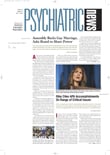It should come as no surprise that people who smoked as adolescents often become nicotine dependent as adults, or that people who were in trouble with the police as adolescents show signs of antisocial personality disorder as adults.
It may be more surprising, however, that people who engaged in specific problem behaviors as adolescents are at risk, as adults, not just for related mental disorders, but for a more generalized psychopathology.
This finding comes from a study conducted by Matt McGue, Ph.D., and William Iacono, Ph.D., professors of psychology at the University of Minnesota. Results appeared in the June American Journal of Psychiatry.
McGue and Iacono studied about 1,300 18-year-olds who were drawn from the Minnesota Twin Family Study. About half of the subjects were boys. Each subject was assessed at age 18 to learn whether he or she had engaged in actions defined by the researchers as problem behaviors—tobacco use, alcohol use, illicit drug use, sexual intercourse, and trouble with the police—and, if so, at what age.
At age 21, the subjects were assessed to learn whether they currently met, or had ever met, diagnostic criteria for nicotine dependence, alcohol abuse or dependence, drug abuse or dependence, antisocial personality disorder, or major depression. Diagnoses were made according to DSM-III-R criteria, the diagnostic standard current at the time that the Minnesota Twin Family Study was started.
The researchers used these assessment data to learn whether adolescent engagement in any of the five problem behaviors was linked with a lifetime diagnosis of any of the five mental disorders by adulthood.
They found that adolescents who had engaged in any one problem behavior were at higher risk for all five of the psychiatric diagnoses than were adolescents who had not engaged in that problem behavior. For example, early alcohol use was associated not just with a lifetime diagnosis for alcohol abuse by age 21, but with a lifetime diagnosis for a major depression by age 21. Adolescent conduct disorder was linked not only with a lifetime diagnosis of antisocial personality by age 21, but with a lifetime diagnosis of a major depression by that age.
“These results clearly show that adolescent problem behavior is associated with a generalized—rather than a specific—risk of adult psychopathology,” the researchers concluded.
“Based on previous research, we had expected that each of the early problem behaviors would be predictive of multiple forms of adult psychopathology,” McGue told Psychiatric News. “The only exception would be depression, which we were not sure would be related.”
The researchers also found that subjects who had engaged in problem behaviors before age 15 were at especially high risk of developing mental disorders by adulthood.
For example, among men who had engaged in four or five adolescent problem behaviors before age 15, rates of substance use diagnoses and antisocial personality disorder all exceeded 80 percent by age 21, while the rate for major depressive disorder exceeded 30 percent by that age.
“What was most surprising to us was the strength of the association,” McGue said, “for example, that knowing whether a child had tried alcohol, had sex, or had smoked a cigarette prior to age 15 would portend such remarkably elevated rates of psychopathology by age 21.”
“Clearly, the expression of multiple problem behaviors early in life identifies a group that is at a very high risk of developing substance use disorders, antisocial personality disorder, and major depressive disorder,” the researchers said.
Thus, prevention strategies targeted at single adolescent problem behaviors will probably not be enough to put this very high-risk group on the right track, the investigators wrote. For instance, interventions that target smoking might help such high-risk youngsters give up smoking. But they may still be vulnerable to psychopathology by the time they reached adulthood.
If such prevention strategies will probably not suffice, what might be effective? “I can only speculate,” McGue said, “but my sense is that what would be needed is some radical intervention that fundamentally alters the course of adolescent development in these at-risk youths. I confess this may be little more than common sense. For a long time, well-to-do families have shipped their troubled youth off to boarding school. Now I don't really know of any research indicating that a radical intervention like that actually works, but my sense is that something like that is more likely to help our most at-risk youth than trying to get them, for example, to stop trying alcohol.”
The study was funded by the U.S. Public Health Service.
Am J Psychiatry 2005 162 1118
